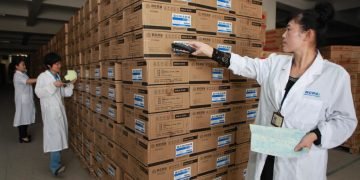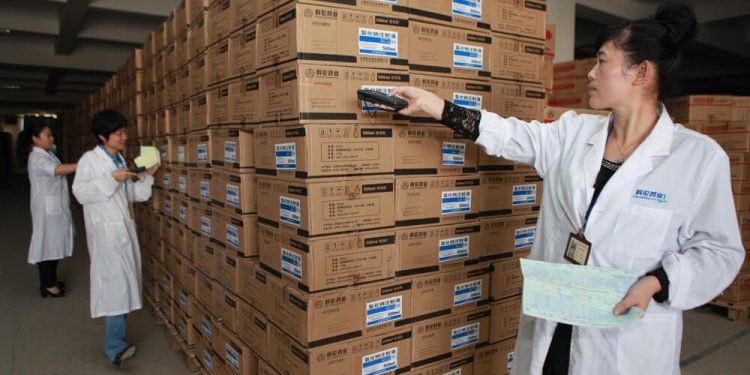By Maria Kalamatas | The Logistic News | April 2, 2025
As the pharmaceutical industry continues to evolve in complexity, reverse logistics services are becoming an increasingly critical component of supply chain strategy. According to a comprehensive market study released by WMR, the global pharmaceutical reverse logistics service market is poised for substantial growth between 2025 and 2032, propelled by rising drug recalls, tightening regulatory mandates, and growing environmental awareness.
The market, which includes a spectrum of services ranging from product returns and disposal to recall management and redistribution, is now attracting major logistics players and technology innovators eager to capture a share of the high-stakes pharmaceutical chain.
Market Overview: From Compliance to Competitive Advantage
Reverse logistics—once seen as a burdensome necessity—is now recognized as a driver of efficiency, compliance, and sustainability. As regulations surrounding pharmaceutical waste tighten, companies are turning to specialized service providers to manage the complex task of recovering expired, damaged, or surplus drugs.
Leading logistics firms such as UPS Healthcare, FedEx, ICSConnect, Inmar, and PharmaLink are among the top players identified in the WMR report. These companies are expanding service offerings that go beyond simple returns, including data-driven solutions, temperature-controlled handling, and regulatory risk management.
Key Market Drivers
-
Regulatory Scrutiny: Stringent global standards—such as those from the U.S. FDA, EU EMA, and WHO—require pharmaceutical companies to trace, report, and safely dispose of products that cannot be sold. Failure to do so exposes firms to both legal and reputational risk.
-
Rising Drug Recalls and Returns: With drug complexity on the rise, particularly in biologics and personalized medicine, return volumes are increasing. Efficient reverse logistics are essential to maintaining cost control and customer trust.
-
Sustainability Demands: Reverse logistics helps reduce pharmaceutical waste in landfills by ensuring proper destruction or repurposing of products, aligning with ESG goals across the healthcare sector.
-
Digital Traceability: Integration of IoT, blockchain, and data analytics now enables real-time tracking of returns, ensuring transparency and accountability throughout the recovery process.
Segment Breakdown
The WMR report divides the market by service type and application:
-
By Service:
-
On-site services: Disposal and handling services provided at the customer’s premises.
-
Off-site services: Centralized facilities for consolidation, evaluation, and destruction of returned goods.
-
-
By Application:
-
Pharmaceuticals: Broad spectrum of prescription and over-the-counter medications.
-
Biopharmaceuticals: High-value, temperature-sensitive drugs requiring specialized reverse handling.
-
Global Footprint & Emerging Markets
-
North America continues to lead the market due to mature regulatory frameworks and the presence of major pharmaceutical players.
-
Asia-Pacific is experiencing rapid growth, particularly in India and China, where increasing drug consumption and production are elevating the importance of structured reverse logistics.
-
Europe, led by Germany, France, and the UK, is focusing on circular economy models and compliance with EU waste directives.
-
Middle East & Africa and Latin America show emerging interest, especially where cross-border pharmaceutical trade is increasing.
Competitive Landscape
Key players such as SF Express, Omni Logistics, Airpharm, and Pharma Logistics are enhancing their offerings through technology integration and strategic partnerships. Startups like Hanzo Logistics and Pharmax Returns are gaining traction with niche services focused on data transparency and compliant destruction protocols.
Challenges & Opportunities
While the sector is growing, it faces barriers:
-
High Setup Costs: Developing infrastructure and compliance systems is capital intensive, particularly for SMEs.
-
Data Security Concerns: Handling sensitive health data requires robust cybersecurity protocols.
-
Lack of Standardization: Varying regional regulations hinder harmonized global reverse logistics practices.
Yet, these challenges create opportunities for tech-enabled disruptors, partnership-driven networks, and cross-border service platforms. Investment in blockchain-based supply chain authentication and AI-powered forecasting tools is expected to accelerate over the forecast period.
Conclusion
The pharmaceutical reverse logistics service market is transitioning from a reactive cost center to a proactive, strategic asset within global healthcare supply chains. With regulatory landscapes evolving and pressure mounting to achieve environmental and operational efficiency, businesses that adopt advanced, scalable reverse logistics solutions will be better positioned to navigate the future.
Maria Kalamatas is a senior correspondent at The Logistic News, specializing in supply chain innovation and global market intelligence. Her work has been featured in leading logistics and healthcare publications.























